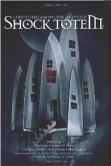Shock Totem 3: Curious Tales of the Macabre and Twisted
K. Allen Wood, Editor
Shock Totem Publications
Trade Paper, 142 pages, $6.99
Review by Sheila M. Merritt
Shock Totem is back on track! After a second issue that didn’t live up to the promise of the first, the third installment delivers the goods. The volume is chock full of short stories, articles, and interviews that tap the spirit of contemporary horror. Combining the edginess of shock, and the classicism of quietly unfolding terror, the volume contains fiction and nonfiction that reflect the current climate of the genre. The tales range from John Skipp’s succinct take on a conqueror worm, to the loss of innocence inherent in discovering truths; natural and uncanny. The stories and essays have punch that goes beyond the gut and into the soul.
In “Drift,” by Amanda C. Davis, the restrictions and wonder of childhood are evoked: “What a thing it is, to be five years old: to be so small that you can be carried where you do not want to go, to be so tender that snowflakes bite like insects.” This sensitive and disarming narrative is reminiscent of Conrad Aiken’s famous “Silent Snow, Secret Snow.” The magnetism of nature’s seductive and sinister magic is an allegory for separation from society.
Separation can also occur, in a physical sense, from the confines of a workplace environment. In the article “Abominations: Voracious Black,” Mercedes M. Yardley remembers trapped miners severed from her community. She recalls her own truncated experience underground: The brief bereft bleakness of being in the pitch dark, and the ensuing fears that surface. When the small town must confront an aborted rescue of the miners, the inevitable heartbreak and residual reserve kick in: “We lose and we mourn and we rail against our fate, and then all we can do is pick up our gear. Take a deep breath. Head back into the waiting darkness, and try avoid its teeth.” The reminiscence is a poignant reminder of the potential cruelty of life, and facing horrible realities.
Reality is the villain in Aaron Polson’s “Wanting It.” Adolescent friends who grow up hearing a yarn about a drowned boy and his parents who subsequently died from grief, desire to experience the supernatural. Youthful yearnings, augmented by old guys’ tales, fuel the flame: “We’d lived on the edge of between adult knowing and childhood believing for two years. The stories those old men told at Daylight Donuts could have frozen our bones, but it didn’t matter much to us. We wanted it. We wanted the dead boy to crawl out of the muck. We wanted the ghosts of his parents to whisper across our necks. We wanted it more than anything.” Substance and shadows war. Facing facts leads to an emotional hurt that lyrically lingers in this lovely and haunting story.
Perhaps the boldest story in the compilation is “Eye, You” by Joseph Morgado. Told in the verbally verboten second person, this is a penetrating examination of self absorption; facilitated by the internet, and the devices capable of rendering at least 15 minutes of fame. The fascinating aspect of the unusual telling of the narrative is: There is much revealed about the central figure, and certain assumptions are made. Yet, despite the wide dissemination of personal information, and the encroaching impression that privacy is compromised, some aspects of character are withheld. The tale plays coy and calculated with what is divulged, and when. Daring and different, the work more than validates its risky choice of style.
Shock Totem 3 reiterates the fine qualities exhibited in issue number 1, and restores its place as a high quality publication. Hopefully, the next issue will retain these most excellent standards.










Thanks, Sheila. We really appreciate the review.